
It was a real pleasure to present my work this week at the Center for Study of Public Choice at @georgemasonu.bsky.social. Many thanks to @markkoyama.bsky.social @jonathanschulz.bsky.social and @vincentgeloso.bsky.social for the kind invitation and great discussion! publicchoice.gmu.edu/events/17530
22.10.2025 17:47 — 👍 2 🔁 0 💬 0 📌 0
The paper might be of interest to students of corporate power and family firms (@danielascur.bsky.social @spachibeusa.bsky.social) and to students of kinship and politics @nathannunn.bsky.social @jonathanschulz.bsky.social @yuhuawang.bsky.social @juanfeliperiano.bsky.social ) 17/n
26.05.2025 14:08 — 👍 4 🔁 0 💬 1 📌 0
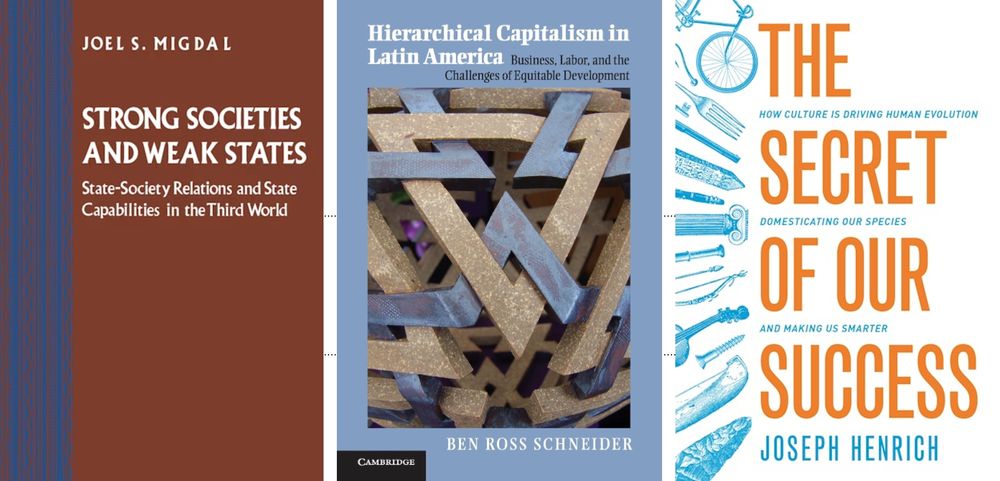
Overall, the paper tries to translate insights from multiple fields on how kinship promotes cooperation into political economy (strategic setting + micro-foundations + causal identification) to study how capitalism works in many parts of the world, and how "the state" and "society" interact. 16/n
26.05.2025 14:08 — 👍 4 🔁 2 💬 1 📌 0
Family ties can also be a source of institutional weakness—the gap between policy goals and outcomes. They deflect policies like campaign finance reform, leading to unintended consequences. This is a growing research area, but we’re only beginning to understand these interactions. 15/n
26.05.2025 14:08 — 👍 0 🔁 0 💬 1 📌 0
All this suggests we should see family firms as *kinship-based economic institutions*. Their political power stems from family ties—a fundamental source of corporate power. This helps explain their political activism and resilience in the face of shocks. 14/n
26.05.2025 14:08 — 👍 1 🔁 0 💬 1 📌 0
To be clear, we trace the political advantage of family firms *to the level of family ties*, above and beyond any other possible confounders. We also show *when* family networks and familial collective action are activated. 13/n
26.05.2025 14:08 — 👍 1 🔁 0 💬 1 📌 0

To our knowledge, this is the first paper to show how family ties solve a high-stakes cooperation problem in a contemporary setting, not just historically or in small-scale societies, but in large corporations facing strategic dilemmas. Kinship in action! 12/n
26.05.2025 14:08 — 👍 1 🔁 0 💬 1 📌 0
Is this really driven by family ties? This is a bit tricky—individuals belong to multiple networks. We reconstructed alternative networks—same firm, same university—and even simulated random ties. But this pattern doesn’t appear there: not all social ties are the same. 11/n
26.05.2025 14:08 — 👍 0 🔁 0 💬 1 📌 0
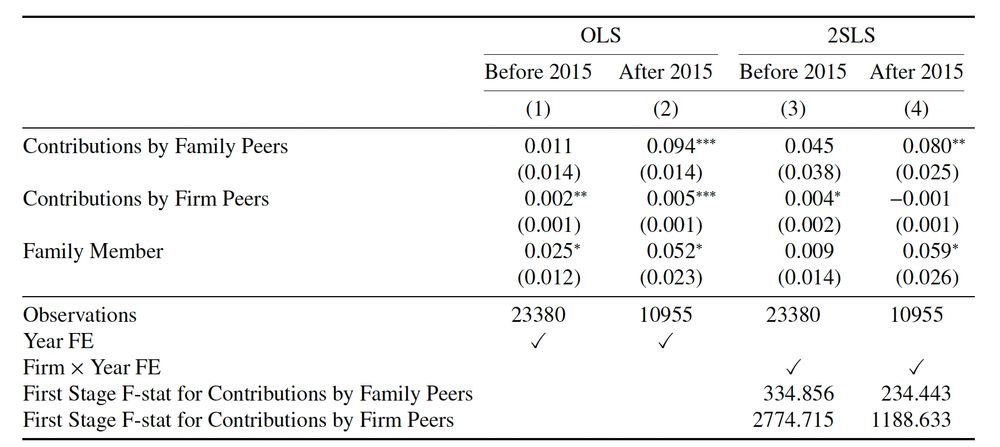
Crucially, the ban activated cooperation among family members: we find evidence of influence (“peer effects”) in their contribution decisions. It altered the social logic of contributions, turning them into strategic complements. 10/n
26.05.2025 14:08 — 👍 0 🔁 0 💬 1 📌 0
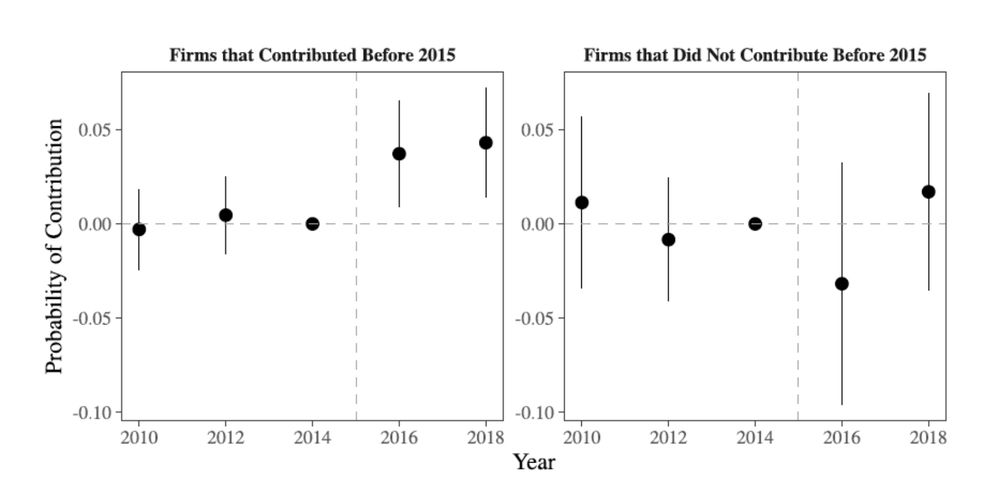
Zooming in on individuals, using data on over 12K businesspeople, members of controlling families started contributing as private citizens after the ban. This behavior was driven by those in firms that had made corporate contributions before the ban. 9/n
26.05.2025 14:08 — 👍 0 🔁 0 💬 1 📌 0
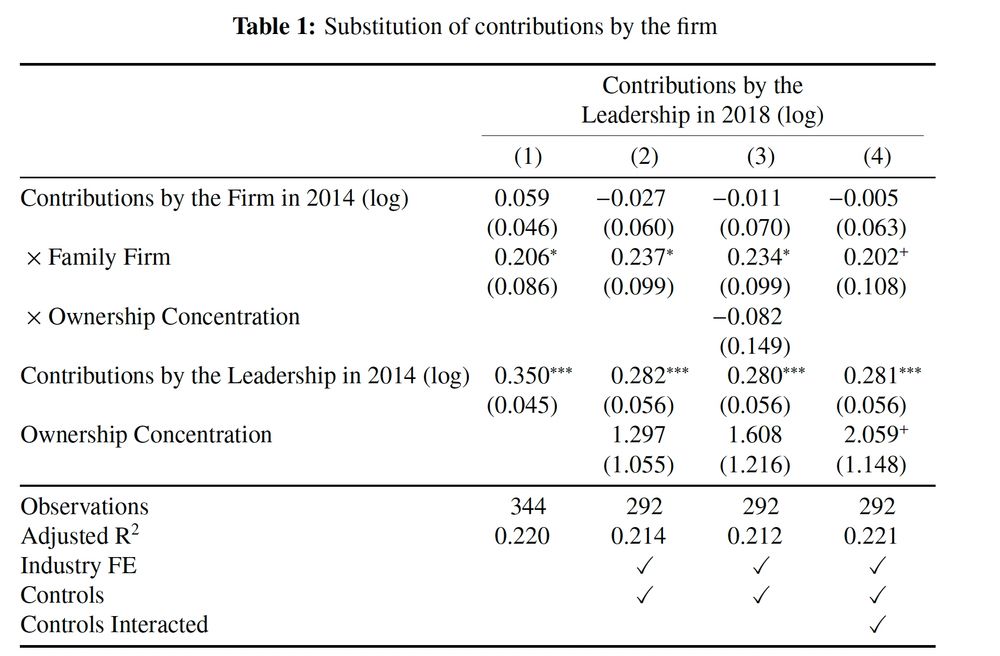
Yes—and here’s how. Family firms replaced corporate contributions with individual ones, while non-family firms didn’t. This result holds across a rich set of controls, including ownership concentration. 8/n
26.05.2025 14:08 — 👍 1 🔁 0 💬 1 📌 0
Kinship ties may help solve this problem. Across disciplines, evidence shows family ties foster cooperation: providing informal insurance, promoting exchange and supporting public goods. Kinship also affects development and institutions.But can it solve high-stakes cooperation in corporations? 7/n
26.05.2025 14:08 — 👍 0 🔁 0 💬 1 📌 0
To understand what happened, we need to see how these policies interact with organizations. If contributions raise firm value, they’re a collective good. When corporate donations were banned, individuals had to decide whether to contribute, creating a classic free-riding problem. 6/n
26.05.2025 14:08 — 👍 0 🔁 0 💬 1 📌 0
But this isn’t the whole story. In our @thejop.bsky.social paper, we uncover a hidden side of the puzzle: how family firms overcome negative shocks. In Brazil, the Supreme Court banned corporate contributions after the Car Wash Scandal. Will family firms keep their political edge after the ban? 5/n
26.05.2025 14:08 — 👍 1 🔁 0 💬 1 📌 0
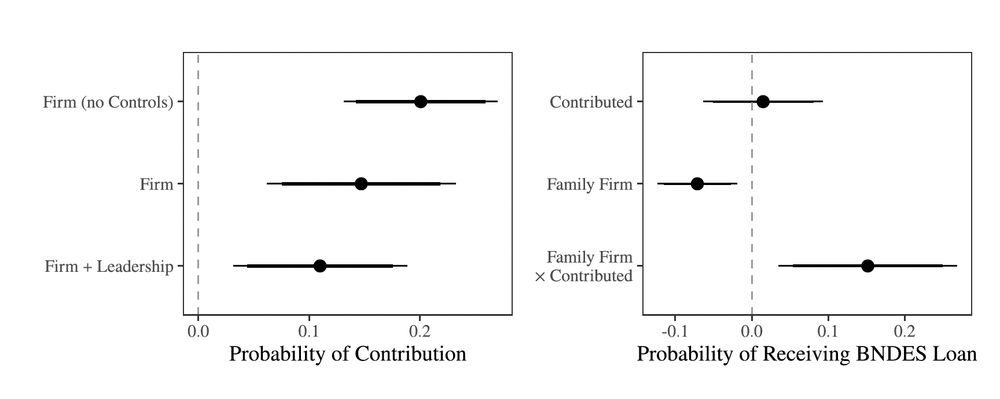
In our World Development paper, we showed that family firms can craft long-term relational contracts with politicians thanks to their long time horizons. This turns them into political heavyweights: more likely to fund political campaigns and extract rents: doi.org/10.1016/j.wo... 4/n
26.05.2025 14:08 — 👍 1 🔁 0 💬 1 📌 0
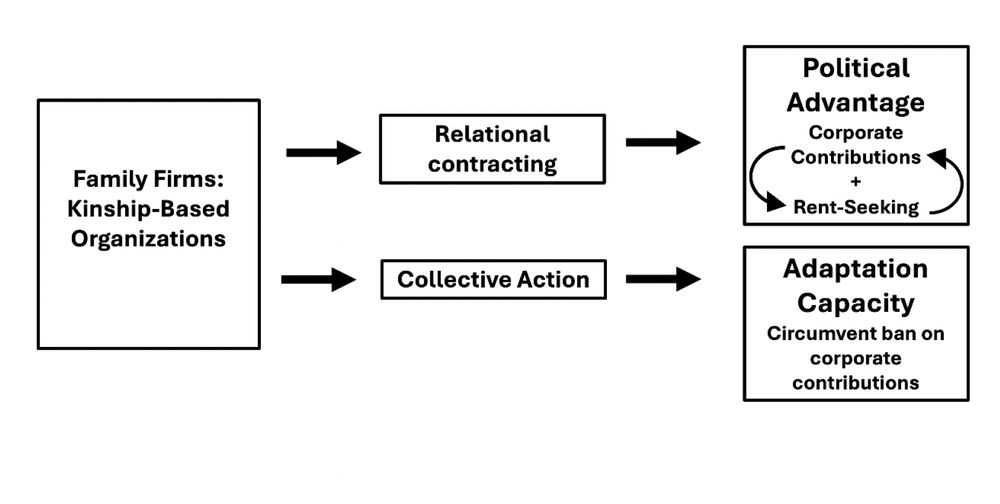
Family firms are less productive but also long-lived and a staple of capitalism in developing countries. Why? The answer to this puzzle may lie in politics. We identify two mechanisms that may explain family firms’ political behavior: *long time horizons* and *collective action capacity*. 3/n
26.05.2025 14:08 — 👍 1 🔁 0 💬 1 📌 0
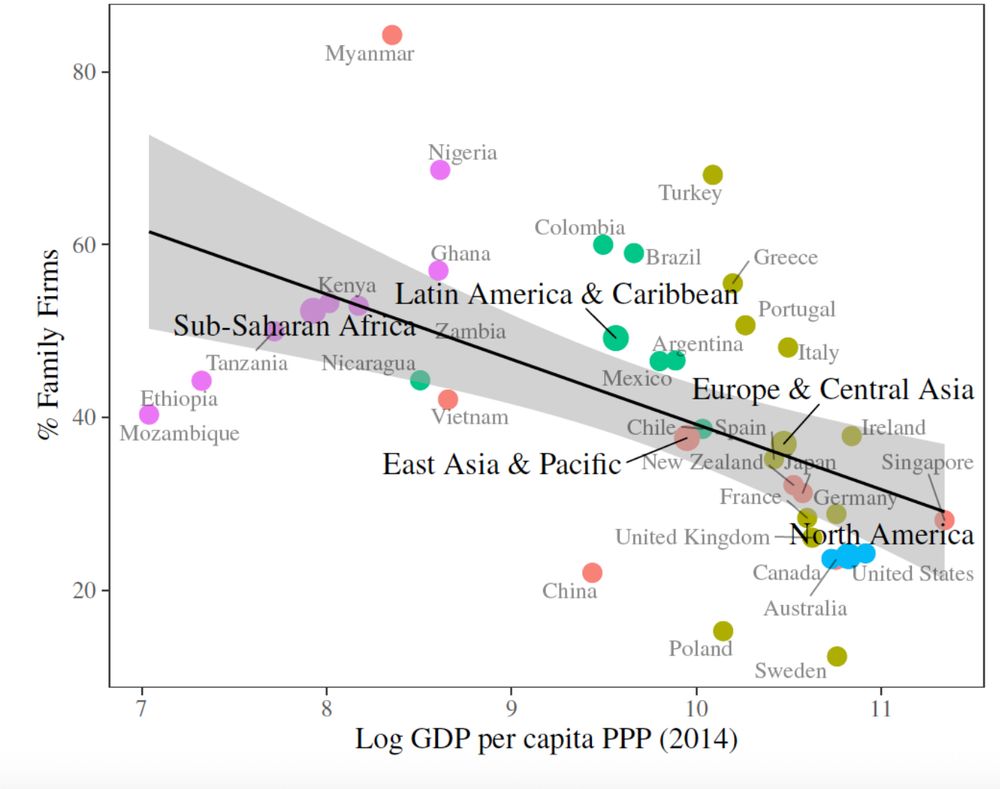
Market economies are embedded in social institutions. In this project, we try to illuminate a long-standing feature of capitalism in the Global South and elsewhere—the prevalence of family-based capitalism. Project summary
@promarket.bsky.social: www.promarket.org/2023/07/24/f...
26.05.2025 14:08 — 👍 8 🔁 2 💬 1 📌 0
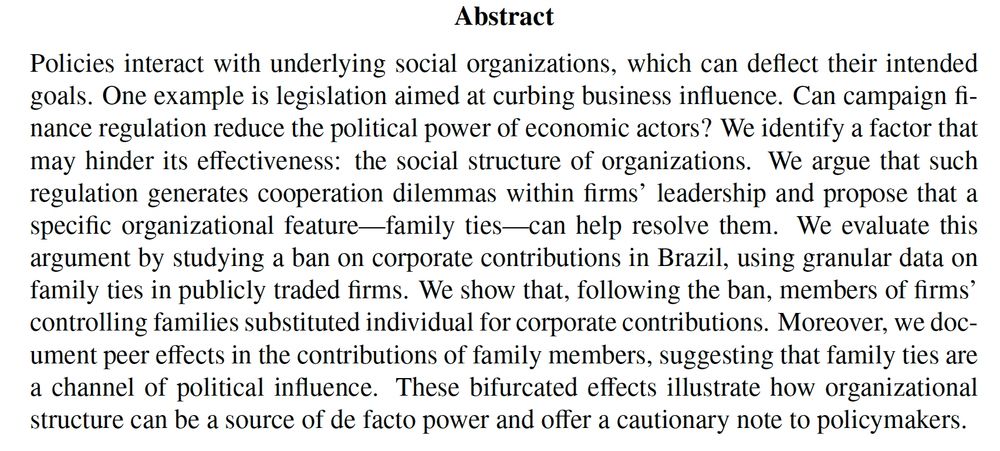
🚨Thrilled🚨 that my paper "Family Ties as Corporate Power" (with @jdodyk.bsky.social and I. Puente) is now available as "just accepted" at the @thejop.bsky.social . Working Paper: doi.org/10.1086/736563
26.05.2025 14:08 — 👍 13 🔁 4 💬 1 📌 0
Asst. Prof. at George Mason University. Interested in cultural evolution, human behavior, economic development and history. https://sites.google.com/site/jonathanfschulz/
Assistant professor of economics at GMU. Québécois economic historian, LSE-trained, TTU-proud, GMU-blood. See my published papers at www.vincentgeloso.com
The official account of George Mason University! #MasonNation 💚💛
www.gmu.edu
I'm an effective altruist mainly reading and boosting posts, but occasionally I'll muse and doodle about effective altruism. I take a balanced approach, so will highlight under-represented views—my opinions will no doubt become apparent :)
ង៉ូវម៉េងយូ
Phd Student at @KCLEcon
🏃♂️anywhere anytime
Personal Website 👉 https://mengyungov.github.io/
Political economy PhD at University of Oxford, Nuffield College. Previously covered Brazil for ACLED, MPhil at Oxford Latin American Centre, and PPE at Warwick. Working on the politics of industrial policy, informal labour, and trade.
States & Institutions of Governance in Latin America
Multilingual database of LatAm legal and political institutions.
Based at Georgetown University's Center for Latin America Studies
https://www.sigladata.org/
Paul Lafargueist, works on networks
Economic historian @UoGuelph w broad social science & historical interests: population health, First Nations demography, mobility, inequality & lives of the incarcerated 🇨🇦🇦🇺🇳🇿🏴
Editing Asia-Pacific Econ History Rev & directing https://thecanadianpeoples.com.
British Academy Postdoctoral Fellow at Queen Mary University of London.
matthewbarnfield.co.uk
Political scientist 🇿🇦🏳️🌈
Associate Editor POQ, EJPG, and R&P
he/him
Far-right, social identities, & electoral behaviour
Writing a book on LGBTQ voters for PUP 🏳️🌈🗳️
http://turnbulldugarte.com/
#ihadablackdog
https://youtu.be/XiCrniLQGYc?si=q-gQTNXfScmgtl4k
Political science professor, academic dean, writer, podcaster, shaker of hands with Mel Brooks — you know, the usual kinks.
Assistant Professor at Texas A&M, conducting research on external validity and the political economy of development (corruption, foreign aid & natural resources) www.mikedenly.com
Anthropologist at UCLA
Health, reproduction, vaccination, mistrust
sprall.github.io
Yale-trained economist thinking about labor, organizational, and personnel economics. RTs, likes, or interactions =/= endorsements.
https://soumitrashukla.github.io/
Interested in how the rich stay rich and the poor poor. Sociologist at @sriucl.bsky.social @ucl.ac.uk. He/him/his. http://perengzell.com Photo bomber @simoneschneider.bsky.social
Cultural evolution researcher at the University of Exeter (Penryn campus), UK.
President of the Cultural Evolution Society @culturalevolsoc.bsky.social
Website: alexmesoudi.com
Varetaget historielæreres interesser siden 1926/27.
Læs mere om vores faglige forening på https://historielaerer.dk/.
International Relations
Applied Econ
Public Policy
Labor Econ









